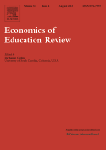 Autores: Claudio Thieme, Diego Prior Jiménez y Emili Tortosa-Ausina
Autores: Claudio Thieme, Diego Prior Jiménez y Emili Tortosa-AusinaTítulo: A multilevel decomposition of school performance using robust nonparametric frontier techniques
Fuente: Economics of Education Review
Resumen: We propose a methodology for evaluating educational performance, from a multilevel perspective. We use partial frontier approaches to mitigate the influence of outliers and the curse of dimensionality. Our estimation considers idiosyncratic variables at the school, class, and student levels. Our model is applied to a sample of students in fourth year of primary school in urban schools in Chile. Results are in line with previous findings that less than 30% of the variance in students’ educational attainment is attributable to their schools. Results also corroborate that a model considering only student-level variables yields high inefficiencies not attributable to school management, but rather to inadequate resource-endowment policy. Therefore, when disregarding specific variables concerning the resources allocated to the schools, the performance of those schools is undervalued, largely because inefficiencies caused by suboptimal resource endowments or difficulties arising from the socioeconomic environment are instead attributed to poor school management.
Cómo citar este artículo:
Thieme, C., D. Prior y E. Tortosa-Ausina, 2012. "A multilevel decomposition of school performance using robust nonparametric frontier techniques", Economics of Education Review, 32, pp. 104-121.
Más artículos






